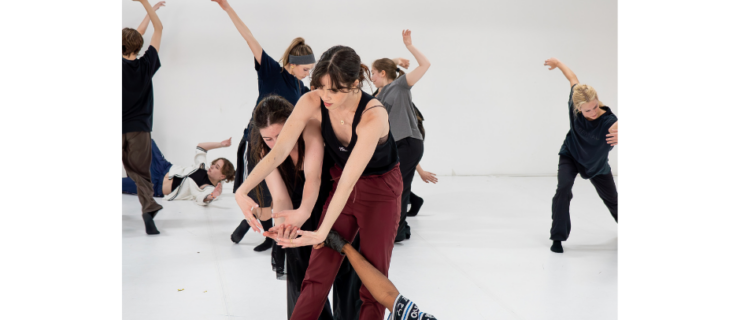What Does It Take for Competition Kids to Transition to College Life?
When you’ve grown up on a competition stage, the college dance scene can feel totally foreign. Many programs will ask you to try movement that’s more experimental than what you’re used to. The pace of classes might feel frustratingly slow. Yet competition dancers bring unique talents to the college classroom—as long as they’re open to a new kind of experience.
The Dos and Don’ts
Do Keep an Open Mind.
To get the most out of your program, you have to be open to the unfamiliar, says Garfield Lemonius, chair of the dance department at Point Park University. Experiment with new movement styles, explore different career paths and break out of your comfort zone.
Don’t Let the Haters Get to You.
Comp kids sometimes face a stigma when they get to college, says Ashley Green, a rising senior at Point Park University and former NUVO and 24 Seven competitor. When Green’s college peers urged her not to dance like a competition dancer, she had to learn to laugh it off. “You can’t change your background,” she says. “It made you who you are.”
Do Be Humble.
If you’re used to winning double platinum, being placed in a lower level can be a blow to your self-esteem. A less advanced placement is likely due to weaknesses in the foundation of your technique, such as pelvic misalignment or rotation issues, says Elizabeth McPherson, associate professor and director of dance at Montclair State University. Although it might feel frustrating, spending time on the basics will make you a better dancer and help ensure a lengthy career.
Don’t Treat Everything Like a Competition.
It can be tempting to approach each class and performance with a competition mind-set, says Green. Instead of trying to one-up the people around you, focus on your own training. This relieves some of the anxiety you might feel in class and teaches you to genuinely root for your classmates’ success, McPherson says.
Do Try New Artistic Approaches.
While competition dancers are skilled at putting on a good show, college students are often expected to be more vulnerable in their performances. “We have the ability to tap into something so much deeper, and it can be scary,” says Alfonse Napolitano, a rising senior at Montclair State University who used to be a Starpower competitor. Don’t be surprised if your college repertoire demands more emotional investment than you’re used to.

Kaylee Wong, Courtesy Green
Tap Into Your Competition Tool Kit
College isn’t about stripping you of your competition background. In fact, your training can be a serious advantage. Don’t leave these qualities behind once you get to college:
Fearlessness.
Competition dancers are often well-acquainted with tumbling and throwing their bodies through space. This willingness to take risks can be a real asset. During an audition for a work being set on Montclair dancers, students were asked to penguin slide across a bench, says Napolitano. While timidity held some dancers back, Napolitano’s competition experience gave him the courage to be the first one across the bench.
Dedication.
Preparing for competitions requires clocking a lot of training hours, and college is no different. While the rigorous schedule of a college dance program might be a bit of a shock to some students, competition dancers are often well-equipped to handle the demand, says Gianna Diaz, a rising senior at Montclair and former Headliners and Access Broadway competitor.
Quick learning.
Competition dancers are adept at mastering choreography quickly, Diaz says. Although you’re probably not taking college works to competitions, picking up the steps faster allows you to invest more time perfecting the nuances of the movement.




